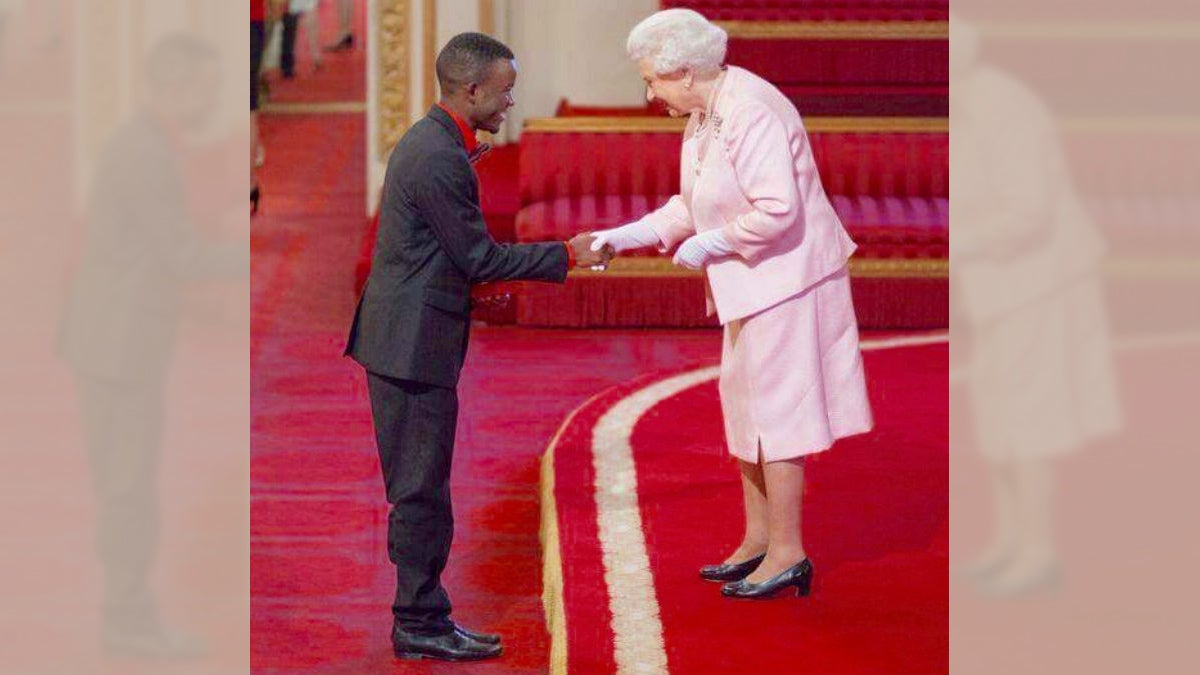Mandela Fellow works to promote change in Zambia [video]
Listen
Queen Elizabeth greets Brighton Kaoma. (Provided)
WHYY caught up with Zambian Brighton Kaoma in Newark as part of the Mandela Washington Fellows training at the University of Delaware.
Zambian Brighton Kaoma started dreaming at an early age.
At 14, he received an opportunity to be trained by the Children’s Radio Foundation. Still a teen, Kaoma took the skills he learned and ran with it — lobbying for free airtime at a radio station so he could host a show to educate the community about pollution.
“For me it’s because someone cared, and it’s because my community in which I was born faced quite a number of challenges, including pollution from the mines, environmental degradation and being exposed to circumstances where each time it rained sometimes the bridge that connected my house to the nearest school washed away, made me realize I needed to do something,” he said.
“But again, someone cared. For me it’s two-fold — it’s because I saw a problem and took that initiative, and because someone cared about me as a young person.”
Kaoma’s environmental activism and community leadership never stopped.
He co-established Agents of Change Zambia, a non-profit supported by the Children’s Radio Foundation to educate youth and encourage them to have dialogues on issues in their communities and work to solve them.
At only 23, Kaoma has worked with UNICEF as a Climate Ambassador, is a Global Youth Ambassador at Children’s Radio Foundation and is an alumni of the Cambridge University Institute of Sustainable Leadership.
In 2015, he was honored with the Queen’s Young Leader Award by Queen Elizabeth II and, in 2016, World Wide Fund for Nature awarded him with the WWF International President’s Award.
Now, he’s one of 1,000 young Africans out of 64,000 applicants that were accepted into the Mandela Washington Fellowship. The fellowship is the flagship program of the Young African Leaders Initiative that provides young people leadership training and networking.
Twenty-five fellows from 20 African countries were placed at the University of Delaware’s Institute of Global Studies to collaborate on civic leadership, and learn best practices for running a nonprofit, before heading to the annual summit in Washington D.C. The university has hosted the Mandela Washington Fellowship Civic Leadership Institute each year since the program’s inception in 2014.
Kaoma is the only one of the fellows placed at UD who actively engages youth in creating radio broadcasts for themselves. When he returns to Zambia, he wants to share what he learned during the fellowship with hundreds of young Zambians.
“When you give the right tools and skills to a young person you are predicting the future, and what’s the best way of predicting the future than giving young people the right tools and exposure to lead? When you sow a seed it will begin to germinate, it will begin to blossom, but for it to blossom and grow in a healthy way it needs sunlight, it needs you to weed it, so there are no weeds influencing its growth—and for me, when a young leader is born they need sunlight, they need the necessary amount of water, and all those external influences are what I refer to as ‘soft skills’ young people get through mentorship,” Kaoma said.
“I grew up in community where rock bottom became the foundation of which I built myself, and I use my story to encourage young people on the African continent and in any other place around the world to believe in themselves and realize the future can only be determined by our efforts as young people, and we don’t have to be sluggish, we need that hunger, and that determination to push our boundaries and realize we are destined for greatness.”
He said one of his top priorities is to spread awareness on global warming, and what people can do to make a change.
“The first thing we need is to educate, second we need to lobby for the right policies, thirdly we need to ensure there’s collaboration,” Kaoma said.
“When you look at the economy, the environment and society, all these are interconnected aspects of sustainable development — but we seem to focus more on one. But I feel they’re all mutually interconnected, and it’s relevant for us to look at each from that perspective. But I believe so strongly we are now living in a world where we can’t wait for someone to fall from heaven and solve our problems. We are in an era where the time for lone rangers has already gone. It’s important for us to collaborate and co-create solutions for development, and work in coordination with others.”
Kaoma said he’s also passionate about decreasing the spread of HIV/AIDS in his country, and increasing acceptance of those with the virus.
“I still go back to the aspect of education, because when you’re properly educated you can be able to know what to do to prevent yourself from contracting HIV,” he said. “But at the same time, we are also having a lot of stigma and discrimination against people living with HIV. What I’m working on is ensuring we stop the vicious cycle of stigma and discrimination.”
Kaoma has advice for anyone who wants to make a difference in their community.
“It’s about starting. There’s no right time to start. If you just feel passionate about any issue it’s important for you to start. You don’t need a billion dollars for you to start something. If someone offers you an amazing opportunity and you’re not sure you can do it you should say yes and learn how to do it later,” he said.
“I don’t think it’s important for us young people to wait for government to do something. There’s a lot we can do on our own, using our own resources and using our own initiative. If we have the willpower to go beyond boundaries, I believe the universe will conspire to help us achieve whatever we want to do. It’s also important to realize we’re human beings that need growth, and if there’s no enemy within, the enemy from outside can do us no harm. It’s important for young people to invest in ourselves, to invest in knowledge, to invest in skills, so when we’re given leadership roles we can execute them with ease.”
And Kaoma’s own dreams aren’t ending any time soon.
“I think you’re speaking to the next president of Zambia,” he said. “So in the next few years I think I’ll invite you to my inauguration in the Republic of Zambia, where I will be giving my address and being sworn in as the next president of Zambia…in a few years from now.”
WHYY is your source for fact-based, in-depth journalism and information. As a nonprofit organization, we rely on financial support from readers like you. Please give today.





